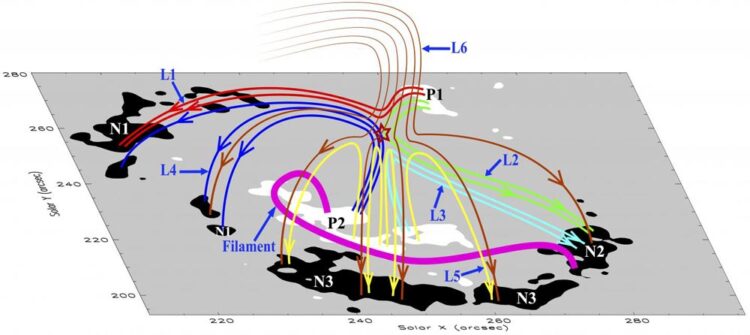Chinese solar telescope reveals acceleration of magnetic reconnection

Two groups of fibrils, marked L2 and L4, converge and reconnect with each other. Two sets of newly formed fibrils, marked L1 and L3, then appear and retract from the reconnection region.
Credit: LI Leping
Magnetic reconnection refers to the reconfiguration of magnetic field geometry. It plays an elemental role in the rapid release of magnetic energy and its conversion to other forms of energy in magnetized plasma systems throughout the universe.
Researchers led by Dr. LI Leping from the National Astronomical Observatories of the Chinese Academy of Sciences (NAOC) analyzed the evolution of magnetic reconnection and its nearby filament. The result suggested that reconnection is significantly accelerated by the propagating disturbance caused by the adjacent filament eruption.
The study was published in The Astrophysical Journal on Feb. 25.
The New Vacuum Solar Telescope (NVST) is a 1-m ground-based solar telescope, located in the Fuxian Solar Observatory of the Yunnan Astronomical Observatories of the Chinese Academy of Sciences (YNAO). It provides observations of the solar fine structures and their evolution in the solar lower atmosphere.
The NVST observed the active region 11696 on March 15, 2013, in the Hα channel, centered at 6562.8 Å with a bandwidth of 0.25 Å.
Employing the NVST Hα images with higher spatial resolution, the researchers studied the evolution of magnetic loops and their nearby filament in the active region, combining the Atmospheric Imaging Assembly (AIA) extreme ultraviolet (EUV) images and Helioseismic and Magnetic Imager (HMI) line-of-sight magnetograms on board the Solar Dynamic Observatory (SDO).
In NVST Hα images, two groups of fibrils converged and interacted with each other. Two sets of newly formed fibrils then appeared and retracted from the interaction region.
“The result provides clear evidence of magnetic reconnection,” said Prof. Hardi Peter from the Max Planck Institute for Solar System Research (MPS), a co-author of the study. In AIA EUV images, the current sheet formed repeatedly in the reconnection region in the lower-temperature channels, and plasmoids appeared in the current sheet and propagated along it bidirectionally.
A filament was located to the southeast of the reconnection region. It erupted and pushed away the loops covering the reconnection region. “The filament eruption led to a disturbance propagating outward across the reconnection region,” said Dr. LI Leping, the first author of this study.
The current sheet subsequently became shorter and brighter, with a larger reconnection rate. It appeared in the AIA higher-temperature channels. In the current sheet, more and hotter plasmoids formed.
“Compared with the observations before the filament eruption during the same time intervals, more thermal and kinetic energy was converted through reconnection after the filament eruption,” said Dr. LI. “The reconnection was thus significantly accelerated by the propagating disturbance caused by the nearby filament eruption.”
All latest news from the category: Physics and Astronomy
This area deals with the fundamental laws and building blocks of nature and how they interact, the properties and the behavior of matter, and research into space and time and their structures.
innovations-report provides in-depth reports and articles on subjects such as astrophysics, laser technologies, nuclear, quantum, particle and solid-state physics, nanotechnologies, planetary research and findings (Mars, Venus) and developments related to the Hubble Telescope.
Newest articles

Sea slugs inspire highly stretchable biomedical sensor
USC Viterbi School of Engineering researcher Hangbo Zhao presents findings on highly stretchable and customizable microneedles for application in fields including neuroscience, tissue engineering, and wearable bioelectronics. The revolution in…

Twisting and binding matter waves with photons in a cavity
Precisely measuring the energy states of individual atoms has been a historical challenge for physicists due to atomic recoil. When an atom interacts with a photon, the atom “recoils” in…

Nanotubes, nanoparticles, and antibodies detect tiny amounts of fentanyl
New sensor is six orders of magnitude more sensitive than the next best thing. A research team at Pitt led by Alexander Star, a chemistry professor in the Kenneth P. Dietrich…





















